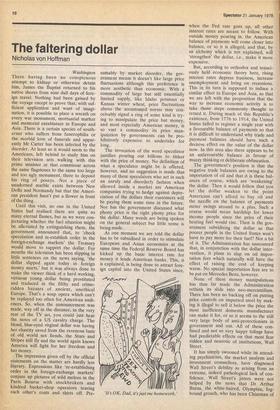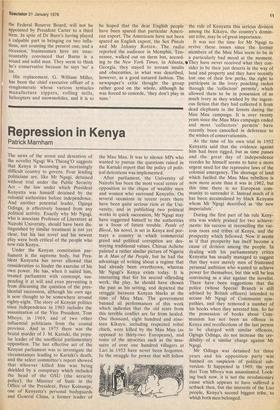The faltering dollar
Nicholas von Hoffman
Washington
There having been no conspicuous attempt to kidnap or otherwise detain him, James the Baptist returned to his native shores from nine dull days of foreign travel. Nothing had been gained by the voyage except to prove that, with sufficient application and want of imagination, it is possible to place a wreath on every war monument, mortuarial marker and memorial entablature in Europe and Asia. There is a certain species of south erner who suffers from funerophilia or the morbid love of funerals and apparently Mr Carter has been infected by the disorder. At least so it would seem to the Americans, left behind to study him on their television sets walking with this prime minister or that commissar across the same flagstones to the same too large and too ugly monument, there to deposit his ring of poseys. Not a piece of unadorned marble exists between New Delhi and Normandy but that the American president hasn't put a flower in front of the thing.
Until this visit, no one in the United States had realised there are quite so many eternal flames, but as we were conjecturing whether the fuel situation might be alleviated by extinguishing them, the government announced that, to 'check speculation and re-establish order in the foreign-exchange markets' the Treasury would move to support the dollar. For months the television has been slipping in little sentences on the news saying, 'the dollar slipped again today in foreign money marts,' but it was always done to make the viewer think of a hard working, virtuous young dollar being prostituted and traduced in the filthy and crimeridden bazaars of ancient, unethical Europe. That's a soap opera which can't be replayed too often for American audiences. So, when the announcement was made, way off in the distance, in the very rear of the TV set, you could just hear the notes of a US cavalry charge. The blond, blue-eyed virginal dollar was having her chastity saved from the ravenous lusts of old world sex fiends, the Stars and Stripes still fly and the world again knows America will fight for her freedom and her money.
The impression given off by the official statements on the matter are hardly less literary. Expressions like 're-establishing order in the foreign-exchange markets' conjure up pictures of wild melees in the Paris Bourse with stockbrokers and kindred bucket-shop operators tearing each other's coats and shirts off. Pre sumably by market disorder, the government means it doesn't like large price fluctuations although this preference is more aesthetic than economic. With a commodity of large but still essentially limited supply, like Idaho potatoes or Kansas winter wheat, price fluctuations above the accustomed norms may con ceivably signal a ring of some kind is try ing to manipulate the price but money, and most especially American money, is so vast a commodity its price manipulation by governments can be prohibitively expensive to undertake for long.
The invocation of the word speculator justifies pouring out billions to tinker with the price of money. No definition of what a speculator might be is offered, however, and no suggestion is made that many of these speculators who act in such an unruly and disorderly fashion when allowed inside a market are American companies trying to hedge against depreciation of the dollars their customers will be paying them some time in the future. Nor has the government discussed what phony price is the right phony price for the dollar. Many words are being spoken on the general subject but little sense is being made.
At one moment we are told the dollar has to be subsidised in order to stimulate European and Asian economies at the same time the Federal Reserve Board has kicked up the basic interest rate for money it lends American banks. This, it is explained, is being done to attract foreign capital into the United States since,
when the Fed rate goes up, all other interest rates are meant to follow. With outside money pouring in, the American balance of payments will come closer into balance, or so it is alleged, and that, by an alchemy which is not explained, will 'strengthen' the dollar, i.e., make it more expensive.
But, according to orthodox and tenaciously held economic theory here, rising interest rates depress business, increase unemployment and bring on recessions. This in its turn is supposed to induce a similar effect in Europe and Asia, so that we are left with the proposition that the way to increase economic activity is to take those steps commonly thought to retard it. During much of this Republic's existence, from 1776 to 1914, the United States failed to register a single year with a favourable balance of payments so that it is difficult to understand why trade and payment balances should have such a decisive effect on the value of the dollar now. In this area also there appears to be an unfavourable balance in favour of muzzy thinking or deliberate obfuscation.
The government's position is that the negative trade balances are owing to the importation of oil and that it is these balances of course, which are 'weakening' the dollar. Then it would follow that you let the dollar weaken to the point Americans can't afford to buy oil and the needle on the balance of payments meter swings around to a plus. Such a course would mean hardship for lower income people since the price of their heating fuel would rise. Then is the government subsidising the dollar so that poorer people in the United States won't have to pay more for their fuel? Not a bit of it. The Administration has announced that, in conjunction with the dollar intervention, it plans to slap on oil importation fees which naturally will have the effect of raising the cost of keeping warm. No special importation fees are to be put on Mercedes Benz, however.
None of these money manipulations has thus far made the Administration rethink its slide into neo-mercantilism. There has been no backing off on putting price controls on imported steel by making it illegal to sell it below the price the most inefficient domestic manufacturer can make it for, or so it seems to the still very large body of anti-protectionists in government and out. All of these confused and not so very happy tidings have had predictable effects on that most fear ridden and neurotic of institutions, Wall Street.
It has simply swooned while its attending psychiatrists, the market analysts and investment counsellors, have diagnosed Wall Street's debility as arising from an extreme, indeed pathological lack of confidence. Wall Street's jitters were not helped by the news that Dr Arthur Burns, the white-haired, Olympian, fogbound grouch, who has been Chiarman of the Federal Reserve Board, will not be appointed by President Carter to a third term. In spite of Dr Burn's having played a culpable part in bringing on two inflations, not counting the present one, and a recession, businessmen here are unaccountably convinced that Burns is a sound and solid man. They seem to think he's conservative because he says 'no' a lot.
His replacement, G. William Miller, has been the chief executive officer of a conglomerate whose various tentacles manufacture zippers, rolling mills, helicopters and snowmobiles, and it is to
be hoped that the dear English people have been spared that particular American export. The Americans have not been spared an English export, the Sex Pistols and Mr Johnny Rotten. The radio reported the audience in Memphis, Tennessee, walked out on them but, according to the New York Times, in Atlanta, Georgia, they stayed to scream insults and obscenities, in what was described, however, as a good natured fashion. The newspaper's critic thought the group rather good on the whole, although he was forced to concede, 'they don't play in tune.'



































 Previous page
Previous page